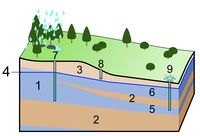
Photo from wikipedia
The Zeng and Beljaars (2005) sea surface temperature prognostic scheme, developed to represent diurnal warming, is extended to represent rain-induced freshening and cooling. Effects of rain on salinity and temperature… Click to show full abstract
The Zeng and Beljaars (2005) sea surface temperature prognostic scheme, developed to represent diurnal warming, is extended to represent rain-induced freshening and cooling. Effects of rain on salinity and temperature in the molecular skin layer (first few hundred micrometers) and the near-surface turbulent layer (first few meters) are separately parameterized by taking into account rain-induced fluxes of sensible heat and freshwater, surface stress, and mixing induced by droplets penetrating the water surface. Numerical results from this scheme are compared to observational data from two field studies of near-surface ocean stratifications caused by rain, to surface drifter observations and to previous computations with an idealized ocean mixed layer model, demonstrating that the scheme produces temperature variations consistent with in situ observations and model results. It reproduces the dependency of salinity on wind and rainfall rate and the lifetime of fresh lenses. In addition, the scheme reproduces the observed lag between temperature and salinity minimum at low wind speed and is sensitive to the peak rain rate for a given amount of rain. Finally, a first assessment of the impact of these fresh lenses on ocean surface variability is given for the near-equatorial western Pacific. In particular, the variability due to the mean rain-induced cooling is comparable to the variability due to the diurnal warming so that they both impact large-scale horizontal surface temperature gradients. The present parameterization can be used in a variety of models to study the impact of rain-induced fresh and cool lenses at different spatial and temporal scales.
Journal Title: Journal of Geophysical Research
Year Published: 2017
Link to full text (if available)
Share on Social Media: Sign Up to like & get
recommendations!